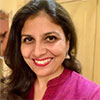It’s been five years since I quit the media to work in the non-profit sector. Whenever I tell people that I work with the disabled community, I get typecast into this ‘saintly selfless soul’, who chose to sacrifice her economic aspirations for the larger good. My vivid imagination introduces music from Ramanand Sagar’s ‘Ramayan’ in the background.
But there’s nothing pious or heroic about my choice of career. It’s a job, albeit with a purpose and a passion for equality. It’s because I work with a minority (not sure if you can call 15% of the global population that), public reactions are riddled with the ‘wow’ element.
Society perceives the disabled as ‘becharas’, something that domain experts and activists have been advocating against. The bechara syndrome arises from our tendency to accentuate the limitation. And what’s physically obvious and ‘different’, is easy to isolate. Often disabled people internalise a feeling of helplessness, which emanates from this societal perception. Many even believe they are paying for the sins of a past life, as part of a divine plan.
It’s interesting how we address someone as blind, deaf, autistic, wheelchair bound and so on. Why don’t we do the same for able-bodied persons? Because we recognise people by their names, characteristics, professions or families. But when it comes to persons with disabilities, we omit the person. Their identity becomes their condition (read inability).
The portrayal of disability in literature, films, television and news also reflects a ‘pitiful’ or ‘abnormal’ existence. Never mind the fact that there are thousands of persons with disabilities who refute the prevalent stereotypes in their daily living.
Recently I heard an interview with Dean du Plessis, a Zimbabwean cricket commentator who is totally blind. Dean is the first and perhaps the only blind person who participated in international matches. It blew my mind to picture a blind guy giving ball-by-ball commentary on radio and television. His techniques were simple, picking audio cues from the stump mics and amassing on his knowledge of the game. Of course, the job requires great attention to detail, because he has no access to visual prompts.
Likewise, there are chefs, dancers, yoga instructors, content writers, radio jockeys, athletes, entrepreneurs and other professionals who lead fulfilling lives despite their disability. Instead of fixating on the problem, they build solutions to circumvent the barriers in physical as well as the virtual environment.
My encounters with a diverse set of people have taught me an important lesson. To bring the focus back on the person. Traits, abilities or inabilities follow next. Hence the usage of the term, ‘person with disability’.
And not all of them are heroes. They can be courageous, determinate, resilient, selfish, greedy or even malicious. There might be nothing ‘divyang’ (divine) about certain disabled folk.
In the American legal and political drama series, ‘The Good Wife’, Michael J Fox plays the part of a scheming lawyer, Louis Canning, who provokes the protagonist, Alicia Florrick for several episodes. Canning suffers from dyskinesia which causes involuntary, erratic, writhing movements of the face, arms, legs or trunk. But his disability doesn’t generate a typically sympathetic response, because the character abuses his condition to get ahead and manipulate situations.
Louis Canning challenges the clichés associated with disability. His flaws humanize him, taking the spotlight away from his ‘suffering’.
The disabled population is a heterogenous subset, just like any other citizen group. So why do we tend to paint them in a certain light?
A battle for equal rights cannot be based on vulnerabilities. The dialogue on disability inclusion has to acknowledge all aspects and complexities of human existence.
Source:https://www.mxmindia.com/2021/09/shruti-pushkarna-half-a-decade-of-lesso...


Facebook comments